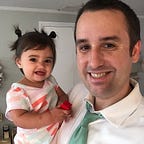Looking back at the “Muslim Ban.”
In January of 2017, Donald Trump kicked off his presidency by issuing Executive Order 13769, shutting down entry into the United States by individuals from a list of majority Muslim countries — operationalizing his long-promised “Muslim Ban,” and spurring a national uproar. In the two years that followed, the ban was struck down as unconstitutional, then withdrawn and re-issued on lightly modified terms by administration. It is still impacting families today.
After coming home from the International Arrivals terminal at DFW Airport — where dozens of lawyer, like myself, and hundreds of protestors had congregated to oppose the policy— I started writing the following.
In the eyes of the Executive branch of the US government, if you are a Muslim citizen you are not only a second class citizen, you are a threat to your country and have to have your rights curtailed. By now that should be pretty clear, but if not:
— Islam is a “vicious cancer inside the body of 1.7 billion people” that needs to be “excised.” — Nat. Sec. Advisor, Gen. Michael Flynn.
— “[Muslims], like termites, hollow out the structure of the civil society and other institutions for the purpose of creating conditions under which the jihad will succeed.” — A “scholar” hosted multiple times by Chief Adviser Steve Bannon on his radio show and cited in speeches by Kellyanne Conway and Nat. Sec. Advisor, Gen. Michael Flynn.
— “Fear of Muslims is RATIONAL” — Nat. Sec. Advisor, Gen. Michael Flynn
— the “Judeo-Christian West” is at war with Islam. — Nat. Sec. Advisor, Gen. Michael Flynn
— “We’re fighting a global existential war” with Islam. — W.H. Chief Adviser, Steve Bannon.
— “You have an expansionist Islam . . . They are motivated. They’re arrogant. They’re on the march. And they think the Judeo-Christian West is on the retreat.” “You could look in 1938 and say, ‘Look, it’s pretty dark here in Europe right now, but there’s something actually much darker. And that is Islam.’ ” — W.H. Chief Adviser, Steve Bannon.
Then look at Trump’s Muslim ban. (Some disagree with calling it a Muslim ban, but consider: for a year he called for a “Muslim ban” explicitly over and over again. He asked his advisers “How do we do a Muslim ban legally” when setting up his policy, and the legal advice was to use country of origin as pretext. And the order has carve outs for non-Muslims seeking refugee status, and exceptions were subsequently made for Israel. So call it what you want. The intent and desired effect is crystal clear.)
Then consider how comparatively little this will do to make our country safe. There is a reason why ISIS is calling Trump’s policy the “BLESSED BAN.” The policy validates their claim that the United States is at war with Islam in general. How does ISIS radicalize young men who later commit attacks? They convince them that their religion and their families are being assaulted by the West and the US specifically. That’s why extremists are saying, Trump was fulfilling the predictions of Anwar al-Awlaki, the al-Qaeda leader who famously said that the “West would eventually turn against its Muslim citizens.” — — -And ironically, the seven Majority-Muslim nations the order applies to have produced virtually no attackers who have targeted the US. These aren’t just my opinions. It doesn’t take much looking to find the bipartisan condemnation for a policy that is gaining us so little compared to causing so many new risks.
And as we give more fuel to extremists who seek to radicalize more people, we’re simultaneously pushing away our best allies we have to fight terrorism. The US cannot fight terrorism in the hotbeds in the Mid-East without cooperation from majority Muslim countries and their citizens (who are overwhelmingly the victims of terrorism, which is why they join with us to fight it). Yet, among the people the ban kept out were Iraqi translators who our troops worked with on a daily basis to fight terrorists. Why would they stick their necks out for us now?
Our country can vet people and protect our national security without needlessly pushing away our allies, dumping gasoline on ISIS’s efforts to radicalize people, and alienating the millions of Muslim citizens of the United States. (If you’re not familiar with our vetting procedures before Trump’s order, it’s pretty easy to find.)
Put another way, we are smart enough to realize that though the KKK claims Christianity as its basis for inflicting thousands of acts of race-based violence for a century, that doesn’t mean the other millions of Christians are inherently enemies of our country. I think we are smart enough to see the same with Islam. As George W. Bush put it, we are not at war with Islam, but with extremists who distort it — a mere few out of the millions of peaceful adherents.
If you don’t see a problem with these policies, keep in mind that the US can win a war against individual terrorist groups — we have our Muslim allies at home and abroad who are willing to join with us, because they are being victimized by these extremists just like we are. But if we decide the US is at war against an entire religion, how can we prevail? Suddenly we’ve made enemies of ¼ of the global population, including our own citizens, which is exactly what extremists are eager to hear. Islam v. the US is the war you want to avoid.
When you hear the highest leaders of a nationalistic regime characterizing members of minority religion as vermin, “termites,” and “a cancer,” think of where you’ve heard that before.
We have to keep opposing these policies vocally.
